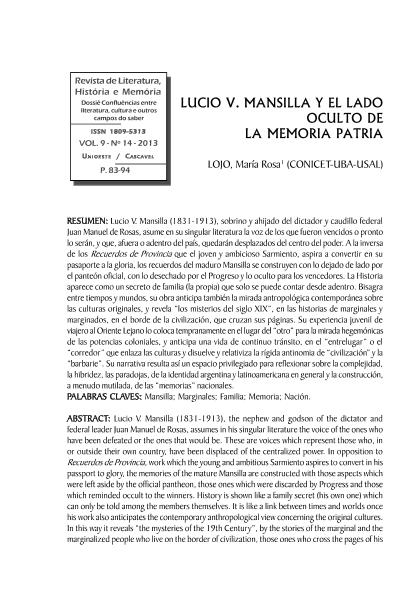Mostrar el registro sencillo del ítem
dc.contributor.author
Lojo Calatrava, Maria Rosa

dc.date.available
2019-06-18T15:44:04Z
dc.date.issued
2013-03
dc.identifier.citation
Lojo Calatrava, Maria Rosa; Lucio V. Mansilla y el lado oculto de la memoria patria; Universidade Estadual do Oeste do Paraná; Revista de Literatura, História e memória; 9; 14; 3-2013; 83-94
dc.identifier.issn
1983-1498
dc.identifier.uri
http://hdl.handle.net/11336/78419
dc.description.abstract
Lucio V. Mansilla (1831-1913), sobrino y ahijado del dictador y caudillo federal Juan Manuel de Rosas, asume en su singular literatura la voz de los que fueron vencidos o pronto lo serán, y que, afuera o adentro del país, quedarán desplazados del centro del poder. A la inversa de los Recuerdos de Provincia que el joven y ambicioso Sarmiento, aspira a convertir en su pasaporte a la gloria, los recuerdos del maduro Mansilla se construyen con lo dejado de lado por el panteón oficial, con lo desechado por el Progreso y lo oculto para los vencedores. La Historia aparece como un secreto de familia (la propia) que solo se puede contar desde adentro. Bisagra entre tiempos y mundos, su obra anticipa también la mirada antropológica contemporánea sobre las culturas originales, y revela “los misterios del siglo XIX”, en las historias de marginales y marginados, en el borde de la civilización, que cruzan sus páginas. Su experiencia juvenil de viajero al Oriente Lejano lo coloca tempranamente en el lugar del “otro” para la mirada hegemónicas de las potencias coloniales, y anticipa una vida de continuo tránsito, en el “entrelugar” o el “corredor” que enlaza las culturas y disuelve y relativiza la rígida antinomia de “civilización” y la “barbarie”. Su narrativa resulta así un espacio privilegiado para reflexionar sobre la complejidad, la hibridez, las paradojas, de la identidad argentina y latinoamericana en general y la construcción, a menudo mutilada, de las “memorias” nacionales
dc.description.abstract
Lucio V. Mansilla (1831-1913), the nephew and godson of the dictator and federal leader Juan Manuel de Rosas, assumes in his singular literature the voice of the ones who have been defeated or the ones that would be. These are voices which represent those who, in or outside their own country, have been displaced of the centralized power. In opposition to Recuerdos de Provincia, work which the young and ambitious Sarmiento aspires to convert in his passport to glory, the memories of the mature Mansilla are constructed with those aspects which were left aside by the official pantheon, those ones which were discarded by Progress and those which reminded occult to the winners. History is shown like a family secret (his own one) which can only be told among the members themselves. It is like a link between times and worlds once his work also anticipates the contemporary anthropological view concerning the original cultures. In this way it reveals “the mysteries of the 19th Century”, by the stories of the marginal and the marginalized people who live on the border of civilization, those ones who cross the pages of his work. His juvenile experience of traveling to the Far East enables him to be early put in the place of the “other” concerning a hegemonic view of the colonial powers. It also anticipates a life of continuous transit, in the “space in-between” and along the “corridor” that bonds the cultures dissolving and relativizing the rigid antinomy of “civilization” and “barbarism”. His narrative results being a privileged space to reflect upon the complexity, the hybridity, the paradoxes of the Argentinean and the general Latin-American identity overall and the construction, often mangled, of the national “memories”.
dc.format
application/pdf
dc.language.iso
spa
dc.publisher
Universidade Estadual do Oeste do Paraná

dc.rights
info:eu-repo/semantics/openAccess
dc.rights.uri
https://creativecommons.org/licenses/by-nc-sa/2.5/ar/
dc.subject
Mansilla
dc.subject
Marginales
dc.subject
Memoria
dc.subject
Nación
dc.subject.classification
Estudios Generales del Lenguaje

dc.subject.classification
Lengua y Literatura

dc.subject.classification
HUMANIDADES

dc.title
Lucio V. Mansilla y el lado oculto de la memoria patria
dc.type
info:eu-repo/semantics/article
dc.type
info:ar-repo/semantics/artículo
dc.type
info:eu-repo/semantics/publishedVersion
dc.date.updated
2019-06-07T14:31:08Z
dc.journal.volume
9
dc.journal.number
14
dc.journal.pagination
83-94
dc.journal.pais
Brasil

dc.journal.ciudad
Cascavel
dc.description.fil
Fil: Lojo Calatrava, Maria Rosa. Consejo Nacional de Investigaciones Científicas y Técnicas; Argentina. Ubatec; Argentina. Universidad del Salvador; Argentina
dc.journal.title
Revista de Literatura, História e memória

dc.relation.alternativeid
info:eu-repo/semantics/altIdentifier/url/http://e-revista.unioeste.br/index.php/rlhm/article/view/11147
Archivos asociados
